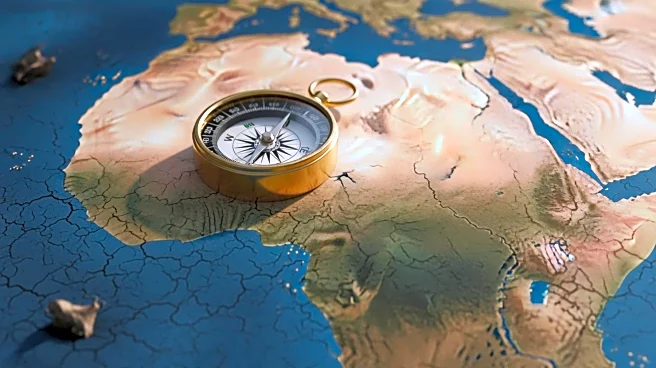What's Happening?
The Horn of Africa, comprising Djibouti, Ethiopia, Eritrea, and Somalia, is a region marked by significant geopolitical and environmental challenges. Historically, the area has been a strategic maritime
gateway, attracting international interest from countries like China and the US, which have established military bases in Djibouti. The region's arid climate and rugged terrain pose obstacles to infrastructure development and economic growth. Additionally, the legacy of colonialism has left lasting impacts, with borders drawn without regard for socio-economic and historical dynamics, contributing to ongoing conflicts. Climate change has exacerbated these issues, with increased droughts leading to severe humanitarian crises, including displacement and malnutrition.
Why It's Important?
The geopolitical significance of the Horn of Africa as a maritime gateway has led to intensified competition among global powers, impacting regional stability. The environmental challenges, particularly those related to climate change, threaten the livelihoods of millions who rely on agriculture and pastoralism. The region's potential for renewable energy, such as solar and wind, offers opportunities for sustainable development, but systemic obstacles and external influences hinder progress. Addressing these challenges requires a comprehensive approach that considers historical, political, and geographic dynamics, fostering cooperation and technology transfer to mitigate climate impacts and promote economic resilience.
What's Next?
Efforts to address the Horn of Africa's challenges must focus on sustainable development and renewable energy utilization. Promoting partnerships that involve regional enterprises in leadership positions could enhance economic opportunities and resilience against climate change. Additionally, addressing geopolitical competition and the colonial legacy requires a strategic approach that considers complex historical and political dynamics. By leveraging the region's renewable energy resources, such as solar and wind power, stakeholders can pave the way for a more sustainable future, reducing reliance on fossil fuels and addressing climate-related inequalities.
Beyond the Headlines
The Horn of Africa's challenges extend beyond immediate geopolitical and environmental issues. The region's potential for renewable energy development is significant, yet local industries are often marginalized by Western and Chinese corporations. This dynamic overlooks the region's unique perspectives on climate change discourse and policymaking. Fostering equal cooperation and mutual learning is essential to harnessing the region's geographical advantages and actively engaging in renewable energy development. Such efforts can contribute to reducing fossil fuel dependence, establishing resilience, and addressing climate-related inequalities.









